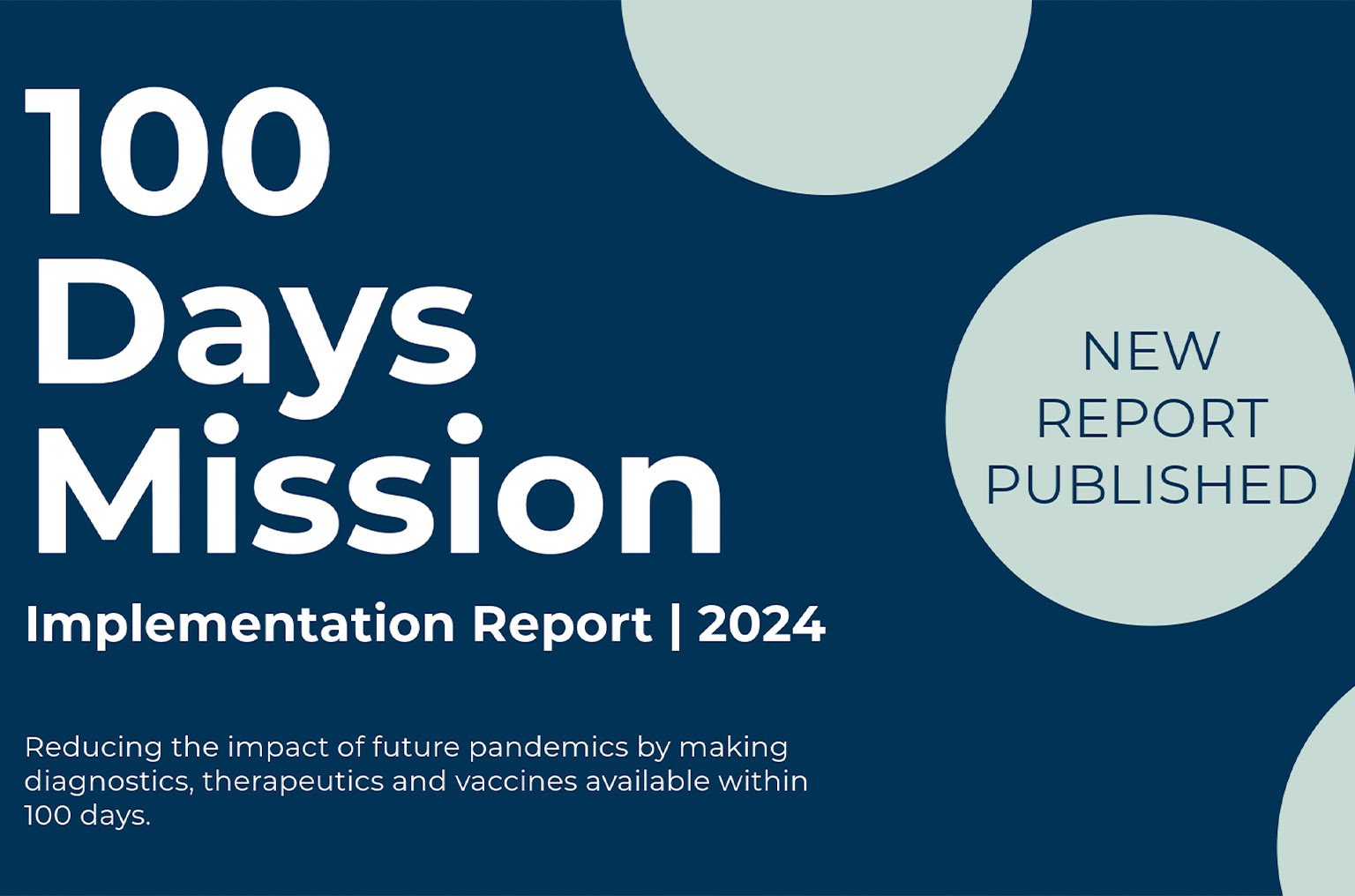‘Reinvigorate the therapeutics pipeline’ urges 100 Days Mission report

Prioritizing early-stage R&D to advance therapeutics for high-risk viral families is one of three key action steps for 2025.
By READDI, February 3, 2025 — The world remains unprepared for another global pandemic. That’s the key takeaway from the 100 Days Mission 4th Implementation Report, launched in Cape Town, South Africa on Jan. 31. The report’s 2024 100DM Scorecard reveals limited progress in terms of newly approved diagnostics, therapeutics and vaccines (DTVs).
Among the report’s findings:
- Seven vaccines entered Phase 1 trials, but only one advanced to Phase 3. The therapeutics pipeline saw just two candidates progress to phase 1 and 2 trials, highlighting limited development for non-COVID pathogens.
- Declines in funding: Non-COVID DTV funding fell by 31% from 2022 to 2023, while overall research and development funding for priority pathogens remains reactive.
- Over-reliance on dominant funding sources: The U.S. government accounted for 60% of global R&D funding (68% excluding COVID-19), highlighting the need for other funders to step in and share both investments and benefits.
- As H5N1 bird flu looms as a potential threat, clarity is needed on the efficacy of current influenza vaccines, therapeutics and diagnostics against this emerging strain.
Once again, due to H5N1 bird flu and other actively circulating viruses, the threat level is rising.”
The 100 Days Mission is an initiative aimed at ensuring global access to diagnostics, therapeutics and vaccines within 100 days of a public health emergency of international concern. It was launched by the International Pandemic Preparedness Secretariat, an independent, time-limited entity that aims to empower a global community of implementation partners, including READDI, to maintain ambition, continuity and accountability toward the achievement of the 100 Days Mission.
“The latest Implementation Report’s sobering headline underscores the importance of the work being done by IPPS and its collaborators,” said READDI CEO Jimmy Rosen. “Five years ago, the response to the emergence of COVID-19 proved that, when the need is urgent, governments, philanthropy and industry can accelerate the discovery and development of life-saving therapeutics. Once again, due to H5N1 bird flu and other actively circulating viruses, the threat level is rising.”
The latest report was unveiled at an event co-hosted with the South African Department of Health and South African Medical Research Council. As the world continues to grapple with evolving threats like the resurgence of Mpox, Marburg and Ebola, and the spread of H5N1, the report underscores the urgency of building a robust and equitable R&D ecosystem.
The report highlights three key areas for action in 2025 that would ensure the world is better prepared for future outbreaks. The report calls on all stakeholders to work together to:
- Reinvigorate the therapeutics pipeline with a focus on early-stage R&D: Prioritize early-stage R&D to advance therapeutics for priority viral families, ensuring robust pipelines are prepared to address emerging threats.
- Enhance coordination to implement the Diagnostics 100DM roadmap: Collaborate with global partners to implement the 100 Days Mission diagnostics roadmap, improving alignment and advancing innovation across the diagnostics sector.
- Sustain clinical trial infrastructure and strengthen preparatory regulatory approaches: Ensure clinical trial networks remain functional between pandemics and adopt harmonized regulatory approaches to accelerate approvals during emergencies.
“With the world still grappling with the impacts of COVID-19 and the emergence of new threats like H5N1 and mpox, the need for the 100 Days Mission has never been more urgent,” said Dr. Mona Nemer, Chair of IPPS and Chief Science Adviser of Canada.
With just two years left in its mandate, the IPPS remains committed to working with all partners to drive systemic change and ensure that the lessons of COVID-19 and subsequent outbreaks result in a safer, more prepared world.
“The time for collective action is now — failure to act risks leaving the world unprepared for the next pandemic,” said Dr. Victor Dzau, Co-Chair of the IPPS Science and Technology Expert Group and President of the U.S. National Academy of Medicine.
Rosen agrees. “Let’s work together to develop easily accessible medicines that reduce severe illness, hospitalization and death, and keep schools and economies functioning,” he said.
